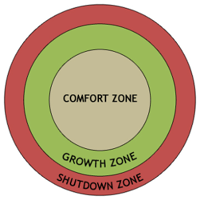Your mindset reveals how you perceive your beliefs and attitudes towards your abilities. Not only does it shape how you define and approach success or failure, but ultimately, it also dictates your emotional, cognitive, behavioural, and neural responses to experiences in your life’s journey. This complex defines your personality and has a massive influence on both your professional and personal lives.
In the book “Mindset: The New Psychology of Success'' by Carol Dweck, a Stanford University Professor of Psychology, she explains how we behave distinctively, especially in our mindset, and discusses the considerable influence of that on our behaviours, actions as well as future success and achievements. Dweck argues that people can have either a "fixed mindset" or a "growth mindset".
People with a fixed mindset are more likely to avoid challenges for fear of failure or looking unintelligent. This leads to poorer performance outcomes.
Those with a growth mindset see failure or setbacks as opportunities to improve. They are more willing to take on challenges which can lead to better learning outcomes.
A fixed mindset promotes focusing only on outcomes like performance, while a growth mindset emphasises the learning process which builds long-term skills.
Carol Dweck's research shows that individuals who adopt a growth mindset are more likely to achieve success. This mindset not only fuels one's determination and willingness to strive for greatness but also forms the solid foundation of belief necessary to attain bigger and better outcomes. It is important to recognise that our beliefs, whether conscious or unconscious, have the power to either propel us towards self-improvement or hinder our progress and prevent us from realising our full potential.
Life and career are inveitably challenging, often leading to demotivation and discouragement. However, it is important to acknowledge that failure is not permanent but an opportunity for growth and improvement. This mindset is crucial for achieving success, both personally and professionally. Let's explore the benefits of adopting a growth mindset.
Having a positive attitude is the key to overcoming failures and hardships. A growth mindset embraces those obstacles as a chance to develop new skills. As a result, growth-oriented individuals do not shy away from burdensome tasks and desire to step out of their comfort zone to broaden their knowledge and expertise, fueling professional growth.
A growth mindset welcomes diverse ideas and viewpoints. It encourages experimentation, risk-taking, and thinking outside the box, which fuels creativity and innovation. Individuals with this outlook can hatch groundbreaking solutions and approaches to problems.
For those with a growth mindset, careers are not just about reaching milestones; they are about the joy of the journey. Bouncing back from setbacks and taking on challenges become their rewards, which lead to a sense of accomplishment and pride. As a result, they tend to be more satisfied and fulfilled in their careers, with greater confidence and self-esteem.
When faced with challenges, have you ever caught yourself thinking, "It’s simply the way I am"? Understanding the concept of a fixed mindset and acknowledging it are the initial steps to bettering yourself. By consciously reframing these thoughts and perceiving them as opportunities for growth and development, we can start cultivating a growth mindset.
Taking the first step by stepping outside of our comfort zones and seeking new opportunities and projects allows us to expand our skills and capabilities. It is through facing challenges that we can discover our true potential and push the boundaries of what we thought was possible.
Rather than solely focusing on the end result, we should acknowledge and appreciate the growth and development we achieve along the way. Focus on the journey, not just the destination. By recognising the small steps we take towards our goals, we can maintain motivation and stay committed to our personal growth.
Your attitude towards criticism is crucial for adopting a growth mindset. Individuals with a fixed mindset perceive criticism as unhelpful. On the other hand, those with a growth mindset feel comfortable and even seek out constructive feedback from others, which plays a critical role in helping them identify areas for improvement and growth opportunities while also cementing relationships with others.
A tip is to actively look for mentors, coaches, or colleagues with insightful advice to leverage and improve.
Others' successes are not a threat; they can be perceived as a source of inspiration. Honour the success of your colleagues and reflect on the lessons you can learn from their journey. Finding inspiration in your environment is a wonderful experience. Every step forward, no matter how small, is a testament to our progress and deserves to be acknowledged and celebrated.
In many ways, the benefits of a growth mindset at the organisational level mirror those at the individual level and positively impact culture, productivity, innovation, problem-solving, and overall performance and success.
Our mindsets have an impact on how we view our goals and react to work and difficulty. A team filled with individuals with a growth mindset can be more innovative and efficient. They welcome difficulties and failures since they help them understand where things went wrong and how to overcome setbacks to achieve success.
Fixed-minded individuals tend to resist change, which can potentially impede the organisation's ability to innovate. These people seek chances only to showcase their prowess rather than expand it. Additionally, they fear experimentation will fail and jeopardise their productivity at work.
A growth mindset in a manager substantially benefits their staff. A growth-oriented leader will welcome suggestions and criticism from staff members without taking it personally or viewing it as a threat to their career.
Managers with growth mindsets are more adept at approaching and directing people when it comes to coaching and mentoring. They will invest in helping their staff members grow through adequate coaching and training programs, which will further nurture a growth culture within the organisation.
Irrespective of their past achievements, a leader with a growth mindset will give equal importance to both positive and negative progress in their team members.
Organisations promoting a growth mindset understand the importance of creating an inclusive and diverse workforce. In a growth-minded environment, diversity is not just seen as a box to be checked or a token gesture. It is embraced as a valuable asset that brings a multitude of perspectives and ideas to the table. A growth mindset encourages organisations to go beyond surface-level attributes and prioritise the potential and talent that exist in every individual.
By fostering an inclusive culture, organisations with a growth mindset create an environment where everyone feels welcome and supported. Employees from underrepresented groups feel empowered to contribute their unique perspectives, knowing that their voices will be heard and valued. This sense of belonging and inclusion motivates individuals to fully engage and invest in their work, leading to increased productivity and innovation.
Organisations that promote a growth mindset also recognise the importance of continuous learning and improvement. They understand that building diversity is an ongoing journey and that mistakes or unconscious biases may occur along the way. However, with a growth mindset, these organisations are committed to learning from these mistakes and constantly improving their inclusiveness over time.
Leaders play a crucial role in shaping the mindset of their teams. By openly discussing their own challenges and learning journeys, they not only demonstrate vulnerability but also inspire their employees to embrace a growth mindset. This sets the stage for a culture where effort and progress are celebrated over perfection, creating an environment that encourages continuous improvement and innovation.
It is important for organisations to acknowledge and celebrate instances where employees demonstrate a growth mindset. By valuing effort and learning even through mistakes, leaders can foster a culture that encourages personal and professional development. This recognition and reward system not only motivates employees to continuously learn and grow but also reinforces the importance of embracing challenges and seeking opportunities for improvement.
Beyond managing the workload, it is essential for organisations to prioritise the growth and development of their employees. By offering comprehensive training and mentoring opportunities that cater to diverse skill sets, leaders can empower their teams to acquire new knowledge and enhance their abilities. Encouraging skill exchange and promoting knowledge sharing within teams further fosters a collaborative environment where individuals can learn from one another and expand their skill sets collectively.
Creating a safe and supportive space for experimentation is paramount in cultivating a growth mindset within an organisation. By normalising setbacks and viewing them as valuable learning experiences, employees are encouraged to take risks and explore innovative solutions. Embracing both successes and failures as opportunities for growth enables individuals to develop resilience, adaptability, and creative problem-solving skills. This culture of experimentation not only drives continuous improvement but also stimulates a sense of curiosity and exploration among team members.
Feedforward is a powerful approach that focuses on looking ahead to goals and improvement rather than dwelling on past performance. This aligns perfectly with the growth mindset philosophy, which believes that abilities can be developed and improved over time.
Targeted feedforward takes feedback a step further by providing concrete actions and recommendations for expanding capabilities. Instead of vague and general feedback, it offers specific guidance that gives individuals a sense of control over their outcomes. This empowers them to take ownership of their development and actively work towards their goals.
Constructive, future-oriented guidance plays a crucial role in building self-efficacy. By showing individuals their potential through achievable goals, it strengthens their belief in their own abilities. This internalisation of ability further reinforces the growth mindset, as individuals start to see themselves as capable of continuous improvement and success.

As individuals, we often find comfort in staying within our comfort zones, but it is crucial for us to embrace the growth zone.
A. Comfort Zone - A familiar place. Things are easy. You seek understanding if it benefits you and isn't too hard. Prefer to be a spectator rather than a player.
B. Growth Zone - It is challenging but doable with time, effort, and perseverance.
C. Shutdown Zone - When it is too much, like hitting "the wall" in a marathon, you cannot go on due to burdens, unfamiliarity, lack of support, and tunnel vision.
To keep pushing yourself and embracing growth, it is essential to acquaint yourself with the five key attributes of the growth zone:
Growth is a challenging journey, but its rewards are immeasurable.
Coaching is not the last resort to salvage an individual with performance issues. A coach does not weigh in their personal opinion or try to solve your specific problems. What they offer is a confidential and supportive board for you.
If your company harbours a growth mindset and provides plenty of opportunities for employees to maximise their potential, coaching should be viewed as a business imperative. And it starts with building a coaching culture for sustainable growth.
A coaching culture requires a coaching mindset and coaching practices to be embedded and applied throughout the organisation. It becomes a part of the company's identity, so it impacts not only the way your employees interact with each other but also with customers and potential clients.
A coaching culture is the breeding ground for radical organisational transformations, that combined with a coaching mindset and coaching practices daily, can facilitate:
A 360-degree feedback program is a tool, a ram, or a method to evaluate one’s behaviour and performance. The process draws in feedback from your supervisors, direct reports, peers, subordinates, and even customers. The process provides a complete overview of how an individual is behaving professionally, hence the "360-degree" name.
360 feedback provides a more holistic view of an individual's strengths and weaknesses from multiple perspectives, not just their manager. This shows room for growth in new areas. Furthermore, the program can highlight specific behaviours and skills that colleagues see as opportunities for development. This allows for the creation of a targeted action plan for strengthening self-awareness.
Seeing feedback from reports and peers puts less emphasis on past performance and more on how one can continue maturing relationships and their professional brand. This underscores the fundamental concept and advantage of feedforward.
Organise frequent 360-degree feedback sessions to allow tracking progress on goals set previously, motivating continuous refinement of skills, and recognising changes in how others perceive you then and now. It also cultivates an environment where asking for performance input is valuable rather than threatening self-perceptions of brilliance or talent.
Managers who model, discussing their own 360 results, demonstrate a growth orientation organisationally.
Psychometric tests offer a valuable tool for gathering objective data on an individual's strengths and areas for development across a range of skills and competencies. Unlike traditional assessments that focus on fixed traits, psychometric tests highlight potential and emphasise that competencies can be moulded and improved with practice.
Psychometric assessments are a scientific method used to measure an individual's capabilities and behavioural style. They are designed to measure a job seeker's or candidate's suitability for a role based on the required personality characteristics and aptitude (or cognitive abilities), or, in other words, the extent to which candidates' personalities and cognitive abilities match those required to perform the role.
Employers use the information collected from the assessment to identify the hidden aspects of candidates that are difficult to extract from a face-to-face interview. Many employers use psychometric assessments as part of the recruitment process.
In addition to identifying the best-suited individual for the job in need, these assessments can also help hiring managers and organisations assess the candidate's fit for the company and team's culture, as well as fast-track the screening stage and schedule to interview only the most promising ones.
The results of these tests are typically accompanied by growth advice, which presents a positive outlook on development and encourages individuals to see their competencies as flexible and adaptable rather than innate talents. By viewing competencies as moldable, individuals are motivated to put effort into practicing and honing their skills, leading to continuous growth and improvement. This growth mindset approach to psychometric testing recognises that individuals have the capacity to develop and evolve their abilities over time through deliberate practice and effort.
What's the ultimate solution to unlocking an individual's full potential? There might not be a single solution for all talent-related challenges. However, organisations can consider leveraging multiple sources of data, including assessments, 360-degree feedback, and coaching, to acquire a comprehensive and well-rounded view of an individual's strengths, weaknesses, and areas for growth.
By integrating these multiple sources of data, organisations can create a comprehensive approach to talent development. This approach recognises that competencies are not fixed or limited but can be nurtured and cultivated through ongoing assessment, feedback, and coaching. It empowers individuals to set goals for themselves, seek continual improvement, and embrace a lifelong learning mindset. Ultimately, this reinforces the idea that potential is not static but can be expanded and developed with the right support and resources.
Middle managers play a vital role in executing an organisation's strategy, translating it into actionable plans, and motivating their teams to achieve success. To thrive in this new era, middle managers need to understand the challenges they face and demonstrate behaviours that align with the evolving demands of their roles.
Neglecting this vital link can result in a loss of momentum and energy within your company.
In our whitepaper, "Strengthening the Vital Link: Developing Growth Mindsets in Middle Managers," we explore what the growth mindset is NOT, and how embracing a growth mindset can propel middle managers forward, and thus fostering motivation, a willingness to learn, and a belief in achieving greater outcomes.
Download our whitepaper, "Strengthening the Vital Link: Developing Growth Mindsets in Middle Managers," today and equip your organisation for success in an ever-changing business landscape.
Security is a major concern in our industry. Using Infor solutions was instrumental in ensuring we were delivering features with a high level of security and data privacy.

Howard Phung Fraser Hospitality Australia
TRG provides us with high-level support and industry knowledge and experience. There are challenges and roadblocks but it's certainly a collaboration and partnership that will see us be successful at the end.

Archie Natividad Aman Resorts
IT, Talent and F&B - we think it's a great combination.
We've thrived since 1994 resulting in lots of experience to share, we are beyond a companion, to more than 1,000 clients in 80+ countries.

© 2023 TRG International. Privacy Policy / Тerms & Conditions / Site map / Contact Us
TRG encourages websites and blogs to link to its web pages. Articles may be republished without alteration with the attribution statement "This article was first published by TRG International (www.trginternational.com)" and a clickable link back to the website.
We are changing support for TLS 1.0 and older browsers. Please check our list of supported browsers.